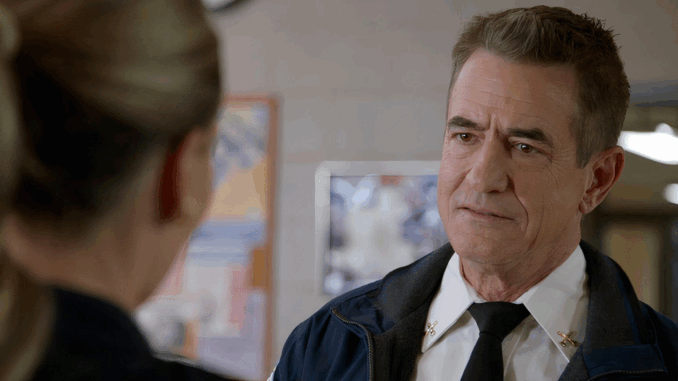
When Fiction Feels Too Real
After thirteen seasons of blazing rescues, intense fireground action, and emotional roller coasters, Chicago Fire Season 13 has proven to be one of its most personal yet. With multiple character exits looming, deeply affecting plotlines, and a growing sense of transition, Firehouse 51 feels like it’s weathering a storm both inside and out.
What’s striking about this season isn’t just who’s leaving—it’s how emotionally charged the departures and current arcs are. From characters confronting inner demons to sudden shifts in long-standing dynamics, Chicago Fire is less about fire this season and more about the people who risk everything to fight it.
Carver’s Inner Battle: More Than a Firefighter
One of the standout storylines this season has been Sam Carver’s battle with alcoholism. While Carver (Jake Lockett) arrived on the scene as a brash, tough-on-the-outside addition to the team, Season 13 has peeled back the layers of his character in meaningful ways. Carver’s struggle with drinking was not simply a plot point—it was portrayed with a sense of authenticity that made it deeply human.
When he took a temporary leave from Firehouse 51 to work on his sobriety, it marked one of the rare times the show paused to reflect rather than react. For fans, watching Carver try to rebuild himself amid the demanding expectations of a first responder’s life added powerful emotional depth.
Unfortunately, just as audiences connected more with the man behind the badge, Lockett’s departure was announced. The timing makes the storyline bittersweet, but it also elevates Carver’s arc into something resonant—painful, unfinished, but undeniably real.
Losses, Big and Small

Season 13 opened with a devastating blow: the sudden death of Chief Pascal’s wife in a tragic car crash. While she was not a central character, the emotional toll it took on Pascal—and the way the firehouse rallied around him—set a sobering tone for the episodes that followed.
Then came one of the most intense moments of the season: Jack being trapped in a burning building, only narrowly escaping death. The tension of that scene was not just cinematic—it was personal. It forced the characters to grapple with the fact that any day could be their last, something the show doesn’t always dwell on despite its subject matter.
In a way, these dramatic moments have reminded fans and characters alike that heroism comes with risk—and that grief is an unwelcome but inevitable part of the job.
Ritter’s Quiet Exit
Another emotional blow came with the announcement that Daniel Kyri would also leave the series by season’s end. Ritter has been a subtle force on the show since Season 7, offering a thoughtful and grounded presence amid louder personalities.
While not always in the spotlight, Ritter was a glue character—one who connected with everyone, mentored younger firefighters, and carried emotional intelligence that balanced out the chaos. Losing him will undoubtedly leave a gap in the team dynamic, even if the writers find a way to offer him a hopeful exit.
There’s a certain grief fans feel for characters like Ritter—not because of any explosive farewell, but because he represented reliability in a world of unpredictability.
The Weight of Change
Behind the scenes, many of these departures are linked to network budget cuts and evolving show strategies. But onscreen, the effect is visceral. The core team that fans have known and loved is slowly fracturing, and it’s impossible not to feel the emotional strain.
The challenge now for Chicago Fire is maintaining its emotional core while navigating this inevitable evolution. If the writers lean too far into constant rotation without anchoring characters, the show risks losing the heart that has made it stand out in a crowded genre.
But if they succeed—by honoring the past and investing in emotionally complex new characters—the series could find itself entering a powerful new chapter.
Looking Ahead with Hope and Uncertainty
Season 13 isn’t over yet, and there’s still room for redemption, closure, and perhaps even surprise returns. Fans are hoping that both Carver and Ritter will get exits that feel earned—not rushed or brushed aside. A heroic rescue, a personal reckoning, or even a simple farewell scene that reflects the bonds they’ve built would be fitting.
As for Firehouse 51, the house may look different going forward, but its spirit doesn’t have to fade. The relationships, the humor, the resilience—those are the elements that define the show more than any one character.
There’s also the possibility of returning faces. With Boden (Eamonn Walker) now recurring rather than gone entirely, and Severide’s (Taylor Kinney) continued presence uncertain but promising, the door remains open for legacy players to step back into focus.
The Legacy of Firehouse 51
What Season 13 has made clear is that Chicago Fire isn’t just a procedural—it’s a story about human endurance. The emotional arcs are no less significant than the flames the firefighters face. If anything, they burn longer.
Whether or not Season 14 becomes a reality, the current season is reminding viewers of why they fell in love with the show in the first place. It’s not just the fires. It’s the people who run into them—and the emotional scars they carry afterward.